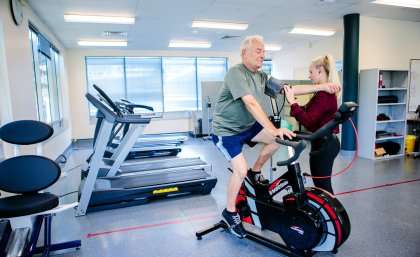Exercise prescribed to reduce fatigue in cancer survivors

New research about what type of exercise best helps cancer survivors overcome fatigue has won PhD student Kirsten Adlard a Clinical Oncology Society of Australia (COSA) award.
The University of Queensland School of Human Movement and Nutrition Sciences researcher said contrary to previous medical advice, high intensity interval training (HIIT) was most beneficial to cancer survivors.
"Around 65 per cent of people with cancer survive at least five years after their initial diagnosis, however between 70 and 100 per cent of survivors experience fatigue that can persist up to 10 years beyond treatment," Ms Adlard said.
"We were encouraged in our study to find that bowel cancer survivors were capable of high intensity exercise with no serious adverse effects.
"Those who performed HIIT three times a week for eight weeks experienced a significant decrease in their fatigue levels.
"Meanwhile, those performing moderate intensity continuous exercise, experienced consistently high levels of fatigue."
Previous medical advice for cancer survivors has focused on rest or low-to-moderate intensity physical activity.
Ms Adlard, a former student at Centenary High School at Jindalee, tested 52 bowel cancer survivors in her study.
The explanation of her findings at November's COSA Annual Scientific Meeting at the Gold Coast led to her being awarded the Best of the Best for clinical oral presentations.
Ms Adlard's accolade was even more noteworthy for the fact the 25-year-old secured the award in a field dominated by senior professors.
UQ colleague James Devin was also recognised at the COSA meeting, winning a Best of the Best award for his poster presentation about the effect of exercise intensity on cardiorespiratory fitness and body composition in colorectal cancer survivors. COSA president Professor Mei Krishnasamy said the growing body of evidence about the benefits of exercise was increasingly influencing the recommendations given to cancer survivors.
"In recent years research has widened our understanding of the benefits of exercise for those undergoing cancer treatment in terms of providing quality of life," Professor Krishnasamy said.
"We are starting to see more research that shows that exercise can also help cancer survivors reduce their ongoing symptoms and improve their odds of longer-term survival.
"Research suggests exercise should be prescribed to cancer survivors just like any other medicine."
















